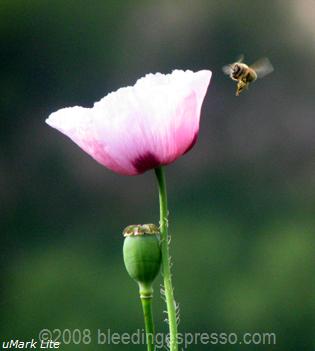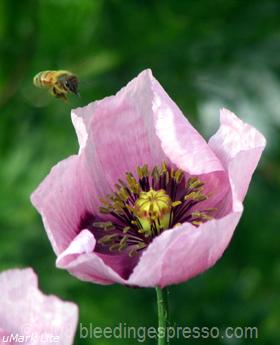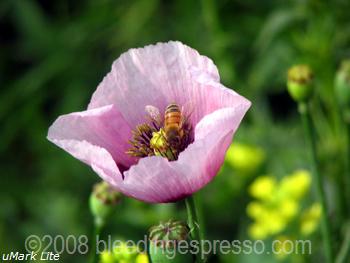Earth Day 2008: The Plight of the Honeybee
 Today is Earth Day, 24 hours for us to stop and really think about how our actions affect the environment.
Today is Earth Day, 24 hours for us to stop and really think about how our actions affect the environment.
Of course we should do this every day, but, according to the Earth Day Network website, since 1970, April 22 has represented at least one day per year for people around the world to “celebrate the earth and renew our commitment to building a safer, healthier and cleaner world for all of us.”
The Earth Day Network site offers many ideas as to how you can get involved:
Volunteer. Go to a festival. Install solar panels on your roof. Organize an event where you live. Change a habit. Help launch a community garden.
Communicate your priorities to your elected representatives.
The possibilities are endless! Do something nice for the earth, have fun, meet new people, and make a difference.
This Earth Day, I’m going to tell you about the birds and the bees.
OK, really just the bees, but I wanted to make sure you were paying attention.
The plight of honeybees may seem small in comparison to many of the other problems our environment faces, but make no mistake–the fact that millions of honeybees are dying (Colony Collapse Disorder) can have disastrous effects not only on flowers and honey but also on food production, including many of the fruits we hold so dear.
Honeybees pollinate about a third of the food we eat, and without sufficient numbers of bees, these crops simply can’t survive.
Why are bees dying?
A few reasons:
- stronger pesticides (which, incidentally, can be toxic to humans as well);
- loss of natural habitats due to urban expansion;
- changes in farming techniques that replace native vegetation with pasture grasses for cattle; and
- more frequent severe droughts in some areas like southern Italy
The endangerment of honeybees has been big news in Italy. The National Beekeepers’ Association (UNAAPI) has seen drastic drops in honey production–as much as 50%–because of a silent “slaughter of bees.” Along with southern Italy, Tuscany and Umbria have also been hit hard.
Environmental group Legambiente and the Slow Food movement have teamed up to help the UNAAPI create a buzz about the endangerment of bees; hopefully world leaders and lawmakers will work together to ensure that we all avoid getting stung by a major loss of honeybees.
For more information and what you can do to help, see PBS’s program Endangered Honeybees and Häagen-Dazs’s page on how to Help the Honey Bees.


















Great post.
The plight of the bees was getting big press in the States as well. The seriousness of the problem cannot be overstated. There are some parts of California where the bees are almost gone. This would devastate the farming communities. Some beekeepers tried to import bees but it back fired. Those bees attacked some of the native ones and then died anyway. I hope the problem get resolved soon.
nyc/caribbean ragazza’s last blog post..Food, Florence, fun
Thanks; I think this is one of those issues that’s *very* important but doesn’t get talked about nearly enough b/c it doesn’t seem so critical on the surface.
Oh wow, I knew there was a problem but wasn’t aware it had gotten this bad. Scary. I hope a solution is found and quickly!
That aside, your pictures are beautiful!
Thanks Christina; that’s how I felt about it too–had heard something a while ago, but then when I really looked into it, I realized just how bad it’s gotten…everywhere 🙁
The bee situation has gotten so bad around here that people are stealing hives from farmers. We also have a problem of bats dying from white fungus that has formed around their mouths while they have been hibernating. It looks like Mother Nature is catching up with all of the damages we have done in our “modern” farming. Again, great photos.
ps: Was told that my wife used to grow snapdragons and that around here they are considered annuals. Also, she said I probably don’t remember as they never looked as good as the ones in Calabria.
Oh that’s horrible Gil (about the hive-stealing and bats). Truly scary stuff 🙁
As for the snapdragons, I believe they’re annuals here too, and bloom from March on through the summer. You’ll just have to come to Calabria in that time to see our pretty bocca di leone 😉
I like that you focused on something – I feel so overwhelmed sometimes about what needs to be done in the world. Happy Earth Day!
It is so overwhelming Sara–and even picking one issue is hard b/c you feel like you’re ignoring the rest. But every little bit counts, right?!
Very interesting… although if you come over to my yard, all of the bees are here! When I was out last week taking pics, I saw dozens and dozens of them.
Beautiful pics, btw!
Cherrye’s last blog post..Catanzaro Has Pretty Doors, Too!
You must get some good honey over there too 🙂
Great post Michelle and beautiful pics. I think that we have gotten to the point where there are just too many causes to keep up with. What a sad refection on our guardianship of this planet.
Joanne’s last blog post..Comfort food, Italian style
Thanks Joanne; I completely agree. Unfortunately 🙁
Excellent post. Along with the reasons listed, I wonder if the amount of electronic chatter, the cell phone signals and electronic pulses of modern life, are also affecting the bees.
running42k’s last blog post..A nice summer ish weekend.
Hmm…good point. Poor bees 🙁
Happy Earth day to you!! There are so many problems out there, glad you picked this one. And I must say…I am impressed with those photos 😉
My Melange’s last blog post..Antiquing in the Hudson Valley
Thanks Robin 🙂
I had no idea the bee problem was so bad. Thanks for pointing it out. Things like that seem small and insignificant but every plant and creature has its purpose and effect on the biosphere. As usual, your pics are divine!
Linda’s last blog post..Bratty bambino goes spicy (sort of)
Thanks Linda, and yes, it’s so true that everything has its place; let’s hope we can still save the bees!
Great Post…Happy Earth Day!
My great great grandparents were bee keepers at one time in Sicily.
I think they would be very sad in deed to see how badly the honey
bees are doing now.
Cherrye right now in my yard we have dozens of wasps! Do they count
as honey producing insects or just an annoyance? The big bumble bees that
I usually see aren’t out and about yet, but I’ll be sure to respect their pollinating ways and stay out of their way this year.
Lucy’s last blog post..Gone To Sarnia
P has actually been wanting to look into raising bees. Wasps, though, ugh–I get so many of them in and around my house in the summer. They love building nests around my beams.
Great post, Michelle! At my firm, we are celebrating Earth Day, as well. We even have a newly formed “Green Committee” that is helping turn the office green in how we work every day. I just posted a blog entry about how my firm is helping us remember Earth Day today. 🙂
Christina Arbini’s last blog post..Happy Earth Day!
Awesome Christina! Thanks for sharing 🙂
Well. Ok. I have to admit something here… a wee tiny piece of me felt a little pang of “ohhhh no, poor bees!” and in my head, I know they serve an important and essential part in the environment but – there is this HUGE part of me that is beyond ScArEd of them! Seriously, give me spiders and snakes any day of the week!! Bees and wasps make me freak out – totally irrational, I know. But, it’s the truth. Even looking at your very beautiful pics of them made me feel a little panicky! Weird huh?
Ok, confession over. Go back to celebrating Earth Day now! 🙂
Oh I hope the panic has passed! *That* kind of panic was certainly not my intent Dory 😉
the bee dilemma is getting very little press where i live. my backyard is full of ’em; i think every bee in a 20 mile radius is currently in my cherry tree.
i was just thinking “what am i going to do for earth day?” and then i thought, “shouldn’t i just be doing those things every day?”
yes, i should.
michelle @ TNS’s last blog post..The Pancakes that Cured Cancer
We all should Michelle. And we need to remind each other often.
Che orrore! The “colony collapse” problem is huge over in the U.S., but I had thought it hadn’t crossed the Atlantic.
What is it they say about canaries and coal mines… ?
Paolo’s last blog post..despair
Yeah we’ve managed to create a problem here too 🙁
I think I accidentally managed to post nothing above. No idea how that happened. Sorry!
Another possible culprit in the disappearance of bees are genetically modified fruits and vegetables. Several plants are now being produced which contain pesticides in the genetic makeup of the plant itself. When an insect eats the leaves of the plant, its insides are liquified. There hasn’t been significant research done to see if the pollen from these plants is lethal to bees, but logic kind of leans that way.
abbersnail’s last blog post..Back to reality
I don’t see anything strange in the posting Abbersnail–glad you persisted!
*Very* interesting about genetically modified fruits and vegetables. And *very* dangerous stuff 🙁
Yes, the poor honeybees are suffering from colony collapse disorder. So far, they haven’t been able to determine exactly what the cause is. Possibly mites or viruses… Then, the honeybees whose hives are stolen, come back from pollinating to find their homes gone! They find the dead bees where there hive used to be, that is really sad… It sure seems as if we’re making a mess of this planet sometimes!
Homebody at Heart’s last blog post..An Italian Cemetery or Scenes from the Afterlife
Oh that’s such a sad scene! And yes, definitely a mess. I *finally* got to watch “An Inconvenient Truth” last night. Wow.
Wow, I had no idea. Thanks for another great post.
I was just in Savannah, and there were bumblebees everywhere. Ginormous bumblebees. I tried to take a picture, but my flash went off and I swear the bumblebee told me off. After that I gave them lots of space.
softdrink’s last blog post..Daughter of Fortune
Aren’t bumblebees fun? I just love that fur 😉
You are such a genuine person.
I love checking in at bleeding espresso.
Ciao Bella,
Francesca
Frances’s last blog post..6 word memoir
Thank you Francesca; I’m looking forward to checking out your most recent post too 🙂
I’ve read about it in the Greek press, too. Scary, isn’t it? Wonderus, too. One being links to another, one act to the next. It’s good that you’ve brought that up. Quite alot is being said of many endangered species, but to be honnest, the plea of the bess is very dear to my own heart. Have you read that donkeys are becoming extinct, too? The world as we know it changes so fast, I am inclined to believe that some madmen are running it.
Irene’s last blog post..Lazarus Saturday-Palm Sunday
I’m afraid I couldn’t agree more with that last part….
I’m a day late, but check this out.
Bee Colony Collapse Disorder info from Burt’s Bees
I’m so into this. Did you know that 1/3 of the food we eat is because of a bee? Plant more flowers and help bring them back!!
Geggie’s last blog post..Hump Day Happenings
Yes Geggie! And thanks for the link!
And in case anyone is reading this on April 23 in Italy, tonight there is a special on the endangerment of bees at 9 pm on National Geographic.
Wow! I didn’t know anything about that! Thank you so much for posting it!
I will bee spreading the word too.
Thanks Honey!
tee hee… sorry… ;o)
Scarlett & Viaggiatore
Wanderlust Scarlett’s last blog post..Wandering With Bay
Hah, you know I think these sorts of puns are the bee’s knees 😉
i HAD to come back and take ~another~ look at these stellar photos!
they are my favorite.
🙂
[[ are you a bee-whisperer or something? ]]
somepinkflowers’s last blog post..tourist tuesday and washington oaks
Oh I wish somepinkflowers! I’m afraid I’m still rather afraid of them 🙁
Please don’t use pesticides in your garden or on your lawn. The bees are suffering from extreme disease overload and their autoimmune systems are shutting down. When our autoimmune system shuts down we suffer from HIV/AIDS and Multiple Sclerosis to name just a few of the diseases. Dr Reese’s upcoming book is entitled “The Incomparable Honey Bee”, Rocky Mountain Books.
Thanks for the tips!